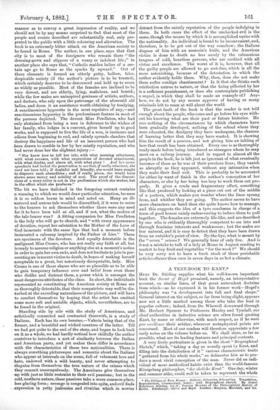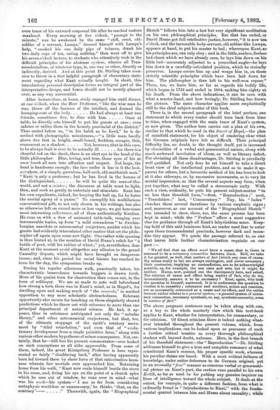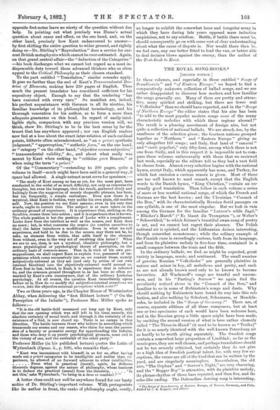A TEXT-BOOK TO KANT.*
HERE Dr. Stirling supplies what his well-known important book the Secret of Hegel promised, namely, an interpretative account, on similar lines, of that great antecedent doctrine from which—as he expressed it in his former work—Hegel's philosophy was "a development into full and final shape." General interest on the subject, so far from being slight, appears now not a little marked among those who take the lead in popular culture ; indeed, from Dr. Whewell downward through Mr. Herbert Spencer to Professors Huxley and Tyndall, our chief authorities in inductive science are often found quoting Kant, by name or otherwise, with much respect, as if he were par excellence their arbiter, wherever metaphysical points are concerned. Most of our readers will therefore appreciate a few early notes on the volume before us. We shall state, as far as possible, what are its leading features and principal contents. A very lively portraiture is given in the short "Biographical Sketch," which, "taking a day as usually spent by Kant, and filling into the distribution of it" various characteristic traits "gathered from his whole works," so delineates him as to pro- duce a most vivid conception of the man. Never did an indi- vidual of more methodical habits exist than the world-famous Konigsberg philosopher, "der ehrliche Kant." One day, winter and summer alike, could well be taken to represent the whole • The Critique of Pure Reason: .Ssihetie, Categories, Srhemotism. Translation, Reproduction, Commentary, Index; with Biographioal Sketch. By James Hutchison Stirling, LL D., Foreign Member of the Philosophical Society of Berlin. Edinburgh Oliver and Boyd. London Simpkin, Marshall, and Co.
even tenor of his outward corporeal life after he reached mature manhood. Every morning at five o'clock, "prompt to the minute," was he awakened by the same "stiff, erect, old. soldier of a servant, Lampe," dressed himself with Lampe's help, "smoked his one daily pipe of tobacco, drank his two daily cups of tea, eating nothing," then went off to give his seven o'clock lecture, to students who attentively took in the difficult principles of his abstruse system, whence all Tran- scendentalism, of whatever type, is, one way or other, directly or indirectly, derived. And at this point Dr. Stirling takes occa- sion to throw in a first helpful paragraph of elementary state- ment regarding what Kant actually taught. In short, this introductory personal description forms an integral part of the interpretative design, and hence should not be merely glanced over, as any way unessential.
After lecture-time, at home, study engaged him until dinner, at one o'clock, when the Herr Professor, "like the wise man he was, threw off the harness of the intellect, and donned the lounging-coat of the body He had always at least two friends, sometimes five, to dine with him Once at table, he directly sets himself to put his guests at ease ; even salutes or rallies them in the homely provincial of the district." Thus seated before us, "in his habit as be lived," he is de- scribed with photographic minuteness,—" a little man, hardly above five feet in height, small-boned, fleshless, meagre, thin, evanescent as a shadow Not, however, that in this case, to be always frail is ever to be actually ill for there is a cheerful red on the cheek, there is an alert eye in the head of the little philosopher. Blue, loving, and true, those eyes of his at once touch all men into affection and respect. Not large, the head is handsome enough ; the face under it has in it the look, s;:rehow, of a simple, garrulous, half-arch, old-maidenish man." "Kant ie only a professor; but he has lived in the houses of
the distinguished, he will be quite the man-of-the- world, and not a cuistre ; the discourse at table must be light, then, and such as gently to entertain and stimulate. Kant has his own expedient; indeed, for keeping the ball up, for be hates the mortal agony of a pause." To exemplify his multifarious conversational gift, as not only shown in his writings, but also as otherwise left on record more or less vague, we get here some most interesting collectanea, all of them authentically Kantian. He runs on with a flow of animated table-talk, ranging over innumerable topics, up from "a mild conundrum " to Sweden- borgian anecdote or astronomical conjecture, amidst which his guests had evidently intercalated other matter that set the philo- sopher off again upon some new flight. One rather wide opening is thus hinted at, in the mention of David Hume's relish for "a bottle of port, with his rubber of whist ;" yet, nevertheless, does Kant at the moment avoid altogether any allusion to the grand Causality dispute, which might have brought on dangerous issues ; and, since his period for social leisure has reached its term for the day, the symposium breaks up.
During his regular afternoon walk, punctually taken, his characteristic benevolence towards beggars is drawn forth. More of his quaint turn for observation then comes out, in the form of soliloquy. We are so made to note well beforehand how strong a turn there was in Kant's mind, as in Hegel's, for dwelling upon and making much of "the concrete," in marked opposition to any mere scholastic abstractedness. Relevant opportunity also occurs for touching on those singularly shrewd predictions which he threw out with reference to more than one principal department of natural science. He had, it ap- pears, thus in substance anticipated not only the "nebular theory," and other astronomical conjectures, but that, too, of the ultimate stoppage of the earth's rotatory move- ment by "tidal retardation," and even that of "evolu- tionary development from a single primitive form," along with various other modern hypotheses of minor consequence. Not, cer- tainly, that he—still less his present commentator—ever looked on such conceptions as all alike approvable. From some of them, indeed, the great Konigsberg Professor is here repre- sented as fairly "shuddering back," after having apparently been led toward them by sheer force of that ratiocinative keen- ness wherein few mortals ever approached him. Returning home from his walk, "Kant now seats himself beside the stove in his room, and, fixing his eye on the point of a church spire which he sees out of window, he runs over in mind—what was his work—his system= I am so far from considering metaphysic worthless or unnecessary,' he thinks, that, on the eontrary " Therewith, again, the "Biographical Sketch" follows him into a last but very significant meditation on his own philosophical principles. Ere that has ended, or David Hume got full retributive justice, however, "it is now ten o'clock, and the inexorable body-servant, old soldier-like Lampe, appears at hand, to put his master to bed ; whereupon Kant, as his principles are, can only obey ; and in the little, sunless, fireless bed-closet which we have already seen, he lays him down on his little bed—accurately adjusted to a prescribed angle—he lays him down in a carefully-calculated position, which he stoically preserves. Lampe covers him up and wraps him in, on those strictly scientific principles which have been laid down for him. The philosopher is then left to his well-won repose."
There, too, we leave him, so far as regards his bodily life,
which began in 1724 and ended in 1804, making him eighty at- his death. From the above indications, it can be seen with
what a master-hand, and how lovingly, Dr. Stirling has drawn the picture. The same character applies more emphatically still to the chief subject-matter of this book.
There is, in the second paragraph of the brief preface, one statement to which every reader should turn back from time. to time, when engaged with the main tenor of Kant's system, as now given. The author here carries out a plan of his own, similar to that which he used in the Secret of Hegel,—the plan of manifold statement, for his object of rendering clear what his German originals have left so difficult. Their principal difficulty lies, no doubt, in the thought itself, yet is increased by obscurities of a verbal and grammatical nature, along with much awkward involution of idiom, as well as literary defect.. For obviating all these disadvantages, Dr. Stirling is peculiarly well qualified. Not only does he set himself to take a direct front view of the intellectual problem, and so to make it ap- parent for others, but a favourite method of his has been to look
at it also sideways, or, by successive movements, so to vary its mental impression, as that the several aspects may form, when
put together, what may be called a stereoscopic unity. With such a view, evidently, he puts his present subject-matter "in no less than threefold form,"—first, "Reproduction ;" next, "Translation ;" last, "Commentary." Nay, his " Index " clenches these several iterations by various emphatic signs ; and, moreover, as our account of the "Biographical Sketch" was intended to show, there, too, the same process has been kept in mind ; while the " Preface " offers a most suggestive clue for guidance through all Kant's labyrinthine maze. Keep- ing hold of this said luminous hint, no reader need fear to enter upon those transcendental precincts, however dark and recon- dite they appear. We quote the passage referred to, as one that leaves little further characterisation requisite on our- part :—
"We all feel that an effect must have a cause, that is, there is assumed to be a necessary connection between them. Still, we take it for granted, as well, that matters of fact (which any case of causa- lity seems really to be) are always contingent, and never necessary ; their contraries, implying no contradiction, are to be acknowledged possible, as, for example, the sun rises and sets, but it might do. neither. Hume, now, pointed out the discrepancy here, and asked, The relation of cause and effect being matter of fact, why do we, inconsistently, assume it to be necessary P Kant, again, who took the question to himself, answered, It is to understate the question to. confine it to causality ; substance and accident, action and reaction, are as necessarily connected as a cause and its effect, and the entire interest rather relates to a general system,—a general system of neces- sary connection, necessary synthesis, or, say, synthetic necessity, even in matters of fact."
The above pregnant sentences may be taken along with one, as a key to the whole masterly view which this text-book applies to Kant, whether for interpretation, for commentary, or for criticism. Of direct criticism there is indeed nothing what- ever intended throughout the present volume, which, from various implications, can be looked upon as precursor of such a further critical treatise as every thorough philosophical student will, beyond doubt, welcome. Here, in the first branch of his threefold statement—the "Reproduction "—Dr. Stirling addresses himself to give a true and complete summary of what constituted Kant's essence, his proper specific work, whereon his peculiar claims are based. With a most evident fullness of knowledge, under entire deference to its German original, yet in an avowedly "free" manner as concerns verbal or grammati- cal phrase on Kant's part, the section runs parallel to his own Kritik, as far as need be for putting any genuine inquirer on lines of intelligence toward the whole subject. It deals at the outset, for example, in quite a different fashion, from what is ordinarily found in "Introductions to Kant," with the funda- mental quarrel between him and Hume about causality; while apposite foot-notes leave no nicety of the question without clue help. In pointing out what precisely was Hame's actual question about cause and effect, on the one hand, and, on the other hand, precisely how Kant endeavoured to answer— by first shifting the entire question to wider ground, and rightly
doing so—Dr. Stirling's "Reproduction" does a service for cur- rent British metaphysics which cannot be over-estimated. Again, on that grand central affair—the "deduction of the Categories" —his book discharges what we cannot but regard as a most in- dispensable duty toward those advanced thinkers who so often appeal to the Critical Philosophy as their chosen standard.
To the part entitled "Translation," similar remarks apply.
It goes no farther than the end of Kant's Transcendental Doc- trine of Elements, making here 230 pages of English. Thus much the present translator has considered sufficient for his -expository object. Enough to say that the rendering "has been executed with every care." So manifest are, indeed, his perfect acquaintance with German in all its niceties, his familiar knowledge of its philosophical terminology, and his thorough veneration for his author, as to form a more than adequate guarantee on this head. In regard of easily-intel- ligible style, comparison with any previous version will, we think, show Dr. Stirling's to be in the best sense by far the truest that has anywhere appeared ; nor can English readers now feel at a loss about the exact inter-relation of such cardinal points, hitherto often misunderstood, as "an a priori synthetic judgment," "apperception," " sthetic form," on the one hand, or " category " on the other hand, "objective versus subjective," 'I' transcendental validity," dm., and about what really was meant by Kant when seeking to "criticise pure Reason," or when using the term "a priori."
Of the "Commentary "—extending to 200 pages, quite a volume in itself—much might have been said in a general way, if space had allowed. A single extract must serve for specimen :—
" The study of Kant among us has as yet, for the most part, been conducted in the midst of so much difficulty, not only as concerns the thoughts, but even the language, that the result, gathered dimly and haltingly from the suggestion of merely rhapsodic phrases, has been, but too frequently, a simple caricature. Even now there is a mystical, ideal Kant in fashion, very unlike his own plain, old-maiden self. Now, the position we see Kant assume, even in his very first words, ought to correct this. The subject is at once taken on the ordinary ground of experience. It is experience that, striking on the faculties, rouses them into action ; and it is experience that is known. 'The whole position is but the position of Locke with a complement. Locke drew from the intellect as well as the senses, and Kant does no more ; but, in what concerns the senses (to confine ourselves to that) the latter introduces a modification. Even in what we call experience, and hold to be due to the senses, may there not be, he asks, an element from within, that adds itself to the element from without, even in the very act of receiving this latter P What we are to see, then is not a mystical, idealistic philosophy, but a mere physiological or psychological theory of perception, on the ordinary basis of common-sense. That is, in view of his own pre- suppositions, we shall expect Kant to explain how, possessed of im- pressions which come successively into us, we convert these, merely subjectively-external as they are (and only by action of our own internal faculties) into the objectively-external world around us. From first to last, indeed, in Kant, it is experience that is referred to, and the common ground throughout is, as has been so often re- marked by Kant's own countrymen, that of the ordinary Lockeian psychology. At all events, the question Kant immediately opens before us is, How do we modify the subjective-internal sensations we receive, into the objective-external perceptions which exist?"
Two or three years ago, in the Chapter House of Westminster Abbey, when delivering the "first Hibbert lecture" (" On the Perception of the Infinite "), Professor Max Muller spoke as follows :—
"It is the old battle-field measured out long ago by Kant, only that the one opening which was still left in his time, namely, the absolute certainty of moral truth, and through it the certainty of the existence of a God, is now closed up. There is no escape in that direction. The battle between those who believe in something which transcends our senses and our reason, who claim for man the posses- sion of a faculty or potential energy for apprehending the Infinite, and those who deny it on purely psychological grounds, must end in the victory of one, and the surrendyr of the other party."
Professor Miller (in his published lecture) quotes the Latin of Wyttenbach (Opusc. ii., p. 109), who remarks that,—
" Kant was inconsistent with himself, in so far as, after having made out a priori categories to be intelligible and earlier than ex- perience, he allowed of no forward advance to other intelligibles.
. From what is practical (moral), again, be deduces theoretic dogmas, against the nature of philosophy, whose business
is to deduce the practical (moral) from the theoretic 'Is not this,' asks Wyttenbach, 'to bring in a dew as machind "
A better close could not well be anywhere found for our hasty notice of Dr. Stirling's important volume. With protagonists like its author in front, the ranks of philosophy ought, surely,
no longer to exhibit the somewhat loose and irregular array in which they have during late years opposed mere inductive empiricism, not to say sciolism. Battle, if battle there must be, should consequently go on with some sort of clear understanding about what the cause of dispute is. Nor would there then be, we feel sure, any one better fitted to lead the van, or better able to deal decisive blows against the enemy, than the author of the Text-Book to Kant.




































 Previous page
Previous page